
It is a truth universally acknowledged that a single man in possession of an electric guitar must be in want of a groupie.
Or something like that. Starting a band to get a girlfriend is a time-honored tactic employed by teenaged film protagonists, after all. Even today, with rock and roll reportedly dead, the idea persists that the sexy sheen of rock music automatically confers some sex appeal upon its practitioners. It’s one of the most unshakeable myths of the twentieth century, informed by the profound connection in the cultural imagination between sex and rock and roll.
Because if sex and rock and roll go hand-in-hand, then it follows that rock stars are mega-studs. In certain cases, a rock star’s sex appeal absolutely has to do with physical appearance—consider Elvis Presley’s matinee idol good looks, Robert Plant’s bare chest and mane of golden hair, Bruce Springsteen’s butt in rigid ‘80s denim—but it’s only the pop stars who have to look pretty. If somebody as weird-looking as Mick Jagger can become a sex symbol through the power of rock and roll, then surely there’s hope for every other man with a guitar in his hands. The implicit promise is that he, too, can harness rock music to become a chick magnet, and why wouldn’t he want to?
In Rock of Ages—Adam Shankman’s 2012 film adaptation of the surprise-hit, jukebox stage musical of the same name—Stacee Jaxx (Tom Cruise) is the biggest rock star in the world. Everyone else in the film utters his name reverentially, as if he’s the embodiment of rock and roll itself. Initially, it seems as though Rock of Ages might take a conventional, if humorously exaggerated, route with its characterization of Stacee as a quintessential rock star/sex symbol.
Stacee Jaxx first appears on screen to the sounds of a steamy jungle beat and a dramatic electric guitar riff.* He emerges from a literal pile of women, four certified babes who have sensually draped themselves over his passed out body and obscured him from view. Stacee’s manager (a perpetually gum-smacking Paul Giamatti) calls the rock star’s name, and Stacee shifts, sending a ripple through his groupies. The women lazily disentangle themselves from Stacee and each other, parting the veil so that Stacee can get up from his bed. The first part of Stacee Jaxx’s body they reveal is his crotch, adorned with a bejeweled codpiece.
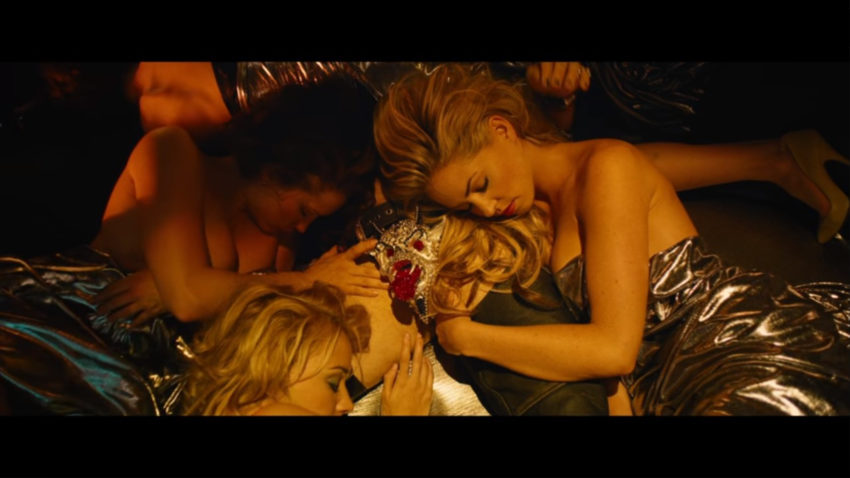
As is immediately evident from this introductory scene, Rock of Ages explicitly, outrageously conflates sex and rock ‘n’ roll in the figure of Stacee Jaxx. Because Stacee is rock ‘n’ roll incarnate, he is also, naturally, sex incarnate. Or, at least, everyone reacts to him that way. The film’s perspective on sex and its relationship to rock and roll isn’t all that straightforward, and this complicatedness is what has prevented me, for a decade, from writing off Rock of Ages as a totally mindless guilty pleasure. Perhaps this understates the case. Let me be more clear: I’ve been utterly fascinated with Cruise’s Stacee Jaxx since I first laid eyes on his naked, tattooed torso. (And what tattoos! The pistols on his hips pointing down his pants? That’s art.)
The entire plot of the film version of Rock of Ages (adapted for the screen by Justin Theroux and Chris D’Arienzo) revolves around Stacee Jaxx, even if he isn’t technically the lead character. At the start of the movie, the Bourbon Room, a fictional stand-in for places like the Whisky and The Roxy, is on the brink of bankruptcy. The club’s proprietors (Alec Baldwin and Russell Brand, vibing on jarringly different frequencies from one another) are counting on Stacee Jaxx to save their business with a guaranteed sell-out attraction. Stacee has agreed to play one last show with his band, Arsenal, at the venue before going solo. All of the main characters in Rock of Ages, aside from Stacee himself, work at the club, so this farewell show becomes the focal point of the film. But the primary driver of the plot isn’t just Arsenal’s final show at the Bourbon. The source of conflict, for all three major plot arcs, stems directly from the question of who Stacee Jaxx has or hasn’t had sex with.
Despite turning the film’s villains into Regan-era Republican politicians—a change from the German real estate developers of the stage version—Shankman’s Rock of Ages is decidedly conservative. For the sake of a PG-13 rating, it’s glaringly conservative about drugs, for one; there’s not a powder or pill in sight in this movie. The illegal substances are hilariously conspicuous in their absence, particularly since the narcotics are so heavily implied in Cruise’s drugged-out performance as Jaxx. And Shankman’s Rock of Ages is also, less obviously but no less deeply, conservative about sex.
The film’s treatment of Stacee Jaxx serves as the site of the film’s most muddled and curiously convoluted assertions about sex and its relationship to rock and roll. In the stage version of Rock of Ages, Stacee is a true supporting character and a much more traditional rock star/sex god. Cruise’s Jaxx, by contrast, is the centerpiece of the film version and an ambivalent sex god at best. There’s a tension between the film’s repeated adulation of the “rock and roll” lifestyle and its distinctly un-rock-and-roll attitude towards sex; the film uses Jaxx, its resident rock god (the figure in which rock and roll and sex most clearly merge), to explore and questionably resolve these tensions.
Tom Cruise’s mesmerizing, off-putting performance gives Shankman’s Rock of Ages exactly what it needs. Only Cruise could convincingly bring this version of Stacee Jaxx—the rock star/sex god whose magnetism isn’t exactly sexual but is mistakenly assumed to be—to life with such clarity and comedic precision. Cruise’s casting electrifies Jaxx’s anxieties over his perceived sex appeal and how integral it is or isn’t to his fame. This isn’t some meta layer the audience brings to the film. Cruise knows exactly what he’s doing here, which makes the performance enthralling.

Cruise’s casting in Rock of Ages was a point of interest and speculation as soon as it was announced. His decision to do his own singing in the film garnered repeated comparison to his dangerous Burj Khalifa stunt in the recently-released Mission Impossible: Ghost Protocol. Entertainment Weekly reported, with a barely disguised hint of incredulity, that Cruise had worn “perhaps the skimpiest outfits of his career,” including assless chaps, for the film. W asked Cruise about all of the “sexy scenes” in the movie after noting that Cruise would be fifty by the time the film came out.
It might not be correct to say that Tom Cruise was never a sex symbol, but I think it’s more than fair to say that he’s never been known for generating much heat on screen. He’s routinely described as a compelling but cold presence—“sexless,” “robotic,” a “beautiful android.” This coldness can veer into creepiness, something the actor has effectively tapped into on occasion to play against his clean-cut leading man persona of the ‘80s and ‘90s. He’s also known for being a try-hard, someone who commits to his roles with an almost maniacal, single-minded intensity. There’s nothing wrong with this, per se, but most people understand sex appeal as something effortless, whether that’s accurate or not. An actor can’t train to be sexy the way he can train to perform death-defying stunts. Generally, paradoxically, the harder one tries to be sexy, the less sexy one seems.
When Rock of Ages hit theaters, there was one thing everyone wanted to know: “Does Tom Cruise embarrass himself?” (The assless chaps get another mention here.) The movie received poor reviews and even worse box office receipts, turning out to be one of the few bona fide financial flops of Cruise’s career. But the general consensus was that, no, Cruise didn’t embarrass himself. In fact, many critics singled out Cruise’s Stacee Jaxx as the only worthwhile thing about an otherwise completely forgettable movie.
The narrative goes like this:
Rock of Ages is a cheesy, saccharine piece of fluff. Although the film takes place on the Sunset Strip in 1987, during the heyday of the legendarily libidinous and druggy hair metal bands that ruled the rock scene there, Shankman presents a determinedly sanitized, grit-less simulacrum of this setting. Rock of Ages uses the hits of Guns N’ Roses, Poison, Foreigner, Whitesnake, Bon Jovi, Def Leppard, and others to punctuate a generic story of boy-meets-girl. This being a musical comedy at heart, the movie conclusively, shamelessly proclaims that the most rock ‘n’ roll thing of all is… true love.
The leading boy and girl, Drew (Diego Boneta) and Sherrie (Julianne Hough), barely make an impression. Supporting player Tom Cruise upstages everyone as Stacee Jaxx, the only character who brings any real rock and roll energy to the proceedings. Dana Stevens wrote, in her review of the film for Slate, that “Cruise’s portrait of the rock star as empty-eyed nihilist doesn’t really belong in this gaudy pop trinket of a movie.” In his positive (and mostly bang-on) review of the movie for Salon, critic Andrew O’Hehir lamented, “Stacee belongs in some other movie, maybe the great film about ’80s rock that Cameron Crowe has never managed to make. In this one [Rock of Ages], he’s like a wild thing, the tragic, dying spirit of rock ‘n’ roll, trapped in a cage made of candy.” Cruise is not only good, he’s too good for the silly film Shankman constructed around his performance. Cruise’s Stacee Jaxx injects a little danger, a little darkness, a little sex into an otherwise safe, light, and sexless movie.
I agree to an extent with this analysis. Stacee Jaxx does steal the movie, and I return to Rock of Ages again and again mostly for the joy of watching my favorite Weird Tom Cruise performance. I don’t agree that Cruise’s Stacee Jaxx doesn’t belong in the version of Rock of Ages that we got.
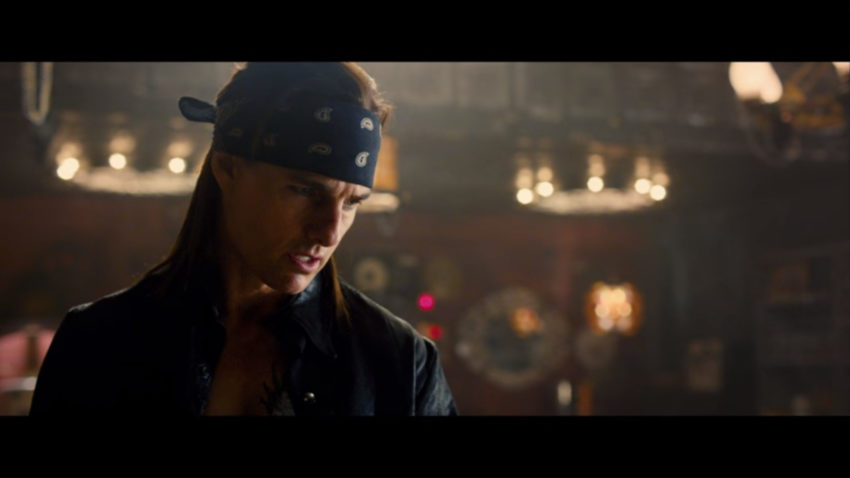
There’s something undeniably perverse about casting Tom Cruise, an actor known for failing to generate much chemistry with his co-stars on screen, as a rock star/sex god. Intriguingly, however, Stacee Jaxx turns out to be a rock god who doesn’t want the sexual attention he receives. It’s implied that maybe Stacee is just over it, that he’s lived that debauched lifestyle long enough and, after a decade plus of rock star excesses, he’s seen it all. What’s another beautiful woman when you’ve had hundreds? Here’s the catch, though, and what makes Stacee a supremely comedic creation rather than a cliché: I don’t believe that Cruise’s Jaxx has ever enjoyed having sex. Not once.
Stacee Jaxx’s sex appeal is entirely manufactured, a product of his status as the biggest rock star in the world, and this only registers so clearly because there’s not much that’s actually erotic about Cruise. The whole set up works to parody the idea that being a rock star makes someone sexually desirable as a matter of course. Cruise leans in, playing the poor little rock star—confused by, ambivalent about, and resentful of the way women respond to him—like a sad sex clown. He’s a rock star, and he’s expected to be sexy. So he’s performatively lewd, permanently shirtless. He gives the people what they want, but he’s totally trapped and perplexed by his sex god persona. Rock of Ages takes this joke about as far as it can go, and Cruise, I would argue, is in on that joke.
At the time of the film’s release, critics picked up on how Cruise might be better positioned than most to understand the psyche of an impossibly famous entertainer who’s been on top for too long. It’s tempting to read Cruise’s performance as some fun-house mirror expression of his own feelings of isolation and pain and disillusionment, and maybe it is, subconsciously. I think Roger Ebert got closer when he claimed in his review of Rock of Ages that “all the stars except the leads are essentially satirizing themselves.” He applauds Cruise for being “the most merciless on himself,” playing Stacee as the worst version of a megastar, a narcissistic ego-maniac.
Sure, Cruise has a reputation for being a demanding perfectionist, and he’s probably as narcissistic as can be expected when a person’s been world-famous for four decades. But with Jaxx, Cruise isn’t just broadly satirizing megastars, himself included. I find the satire rather more pointed. As Jaxx, Cruise sends up the image of himself as sexless and plays with audiences’ perceptions of his sex appeal (or lack thereof).
Cruise’s sex appeal has been a much-debated topic in Hollywood for decades now, and addressing this through surprising role choices wasn’t new territory for Cruise by 2012. Two fan-favorite Weird Tom Cruise roles, Lestat de Lioncourt in Interview with the Vampire and Frank T.J. Mackey in Magnolia, serve as clear predecessors to Stacee Jaxx. Lestat, like Stacee, is circumstantially sexy; being a vampire, like being a rock star, brings with it an immediate seductive allure. Mackey’s a wannabe rock star, with his leather vest and cuffs, teaching disgusting “Seduce and Destroy” seminars about how to get women to fall at men’s feet the way they literally fall at Stacee’s. All three roles require Cruise to be sexual, often obscenely so, but he isn’t necessarily sexy in any of these films. All three characters are intentionally repellent to different degrees.
If Lestat and Mackey are nods to and subversions of expectations regarding how sexual Tom Cruise can or should be on screen, only Stacee directly addresses how fame as an entertainer distorts and influences a person’s perceived sexual desirability. And while a mischievous sort of humor infuses Cruise’s performance as Lestat, Stacee is the only character of the three calibrated primarily for comedic effect. Cruise’s performance in Rock of Ages, while clearly coming from some place deeper and more committed than the other actors’ work in the film, is just as funny, just as outlandish, and just as artificial. Cruise’s Jaxx doesn’t illuminate some truth about fame or rock stardom. Cruise’s Jaxx is an impossible fantasy creation that simultaneously lampoons the idea of a famous entertainer who doesn’t enjoy the sex that comes with the territory and provides a bizarre argument for the disentanglement of sex appeal from value as an entertainer (especially entertainers like rock stars or movie stars who are expected to be sexy).
This slipperiness is what makes the movie version of Jaxx so fascinating and Cruise’s performance so rich. If Cruise had simply brought a genuinely hot rockstar energy to the role, played it straight like so many others who played the role on stage before him, I don’t think I’d be thinking about his Stacee Jaxx a decade later.
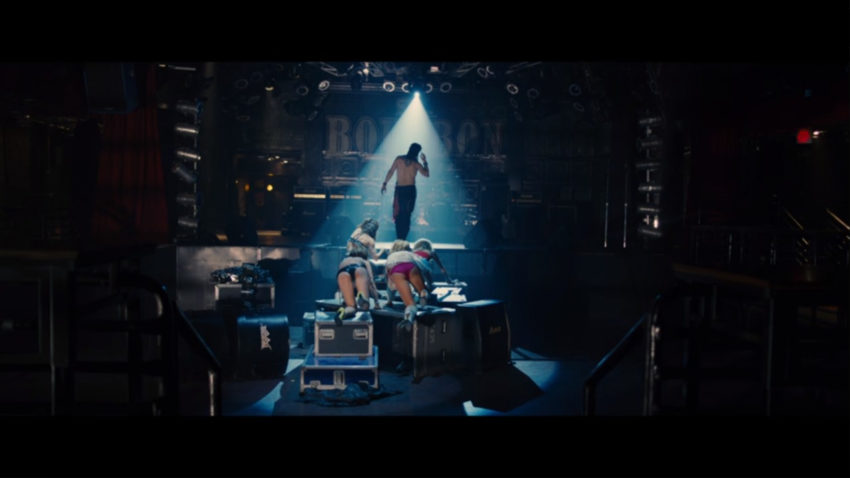
Stacee Jaxx gets three musical numbers in the film, and they come almost all in a row, smackdab in the middle of the movie. “Wanted Dead or Alive,” “I Wanna Know What Love Is,” and “Pour Some Sugar On Me” form the high point of Rock of Ages. They’re all killer numbers.
Cruise turns “Wanted Dead or Alive” into a song about how tiring it is to be sexually desired by literally everyone. The “wanted” here gets a plainly sexual connotation; as Cruise struts through the number, looking off into the distance as he sings his tale of woe, a group of women trails him, touching him, trying to get a piece of him. “Pour Some Sugar On Me” begins with Jaxx on stage, shaking a bottle of beer in front of his pelvis with his back to the crowd (giving them the impression that he’s jerking himself off) before “ejaculating” the foam spray. Cruise lays it all out in this number, performing the whole song on stage, being the rock god we’ve been promised Stacee is.
The crown jewel, however, and the number that gets to the heart of Stacee’s (and maybe the film’s) whole deal, is “I Wanna Know What Love Is.” Before Arsenal’s show at the Bourbon, Stacee’s manager has arranged for the star to give an interview to Rolling Stone reporter Constance Sack (Malin Åkerman, maybe never better than she is here). Stacee’s first number, “Wanted Dead or Alive,” is framed as Stacee’s answer to Constance’s first interview question. She asks him, “What’s it like to be the Stacee Jaxx?” And he launches into the Bon Jovi song.
Constance doesn’t buy Stacee’s bullshit. She tells him he’s not a cowboy, but a “man-child stuck in a rut.” She dresses him down, telling him he’s not great any more. Stacee suggestively eggs her on, moaning, “I love it when you talk dirty” and growling, “That’s right, just give it to me rough.” He wears his sex god persona like an armor.
“I think you get this sense of entitlement due to the fact that you’re a rock god,” Constance says to him, thinking that she’s seen right through him. “But it’s not real. It’s not love.”
“No, it’s not love,” replies Stacee, startling Constance with his self-knowledge.
“Then what is it?” she asks.
“Off the record?” Jaxx pauses before leaning in close to Constance and obscenely hissing, “Ssssss-ex.”
After letting that land, he launches into one hell of a monologue, continuing, “And other people’s projections of what they want me to be. Of what you and all your readers want me to be. Sex. And it keeps me from going out and getting the thing that could save me. But I can’t have that now. I’m a slave to rock and roll. I am searching for the perfect song, the perfect sound that will make you want to live forever.”
This initiates a positively incredible duet between Stacee and Constance, in which the two of them sing Foreigner’s power ballad to each other as they shed their clothes. Stacee puts the charm on Constance, using his inexplicable rock star sex magic on her until she’s so worked up that she throws him down on a pool table to straddle him. Stacee’s also just telling Constance what she wants to hear. He’s singing that he wants to know what love is, with her, the only person who’s perceptive enough to understand him. Although Stacee later comes to realize that she is special, he’s sort of manipulating her in the duet scene, showing her how powerful it is when he gives in and becomes “what they want me to be.” Constance starts to understand this when she watches Jaxx perform “Pour Some Sugar on Me” in front of a crowd his next scene, working the magic. Cruise’s face remains contorted in anguish for the whole Foreigner number; and it’s purposefully unclear if Stacee is anguished because Constance has seen his vulnerability, or if he’s anguished because he’s being forced to be sexy again.
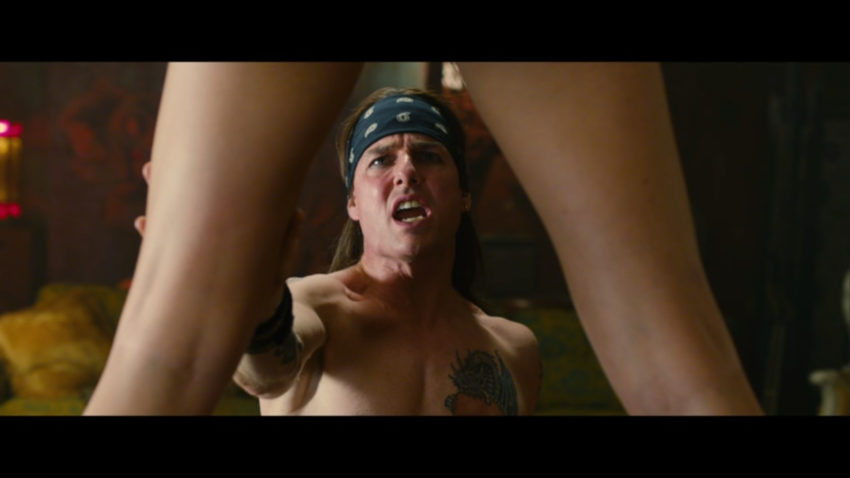
This scene is uproariously raunchy. Constance begins her part of the second verse on her knees with the laces to Stacee’s pants in her teeth. He starts the second chorus, belting “I wanna know what love is,” with his face inches from her ass. He sings into her boobs. He sings into her crotch. (Eat your heart out, Adam Driver.) She almost falls off the pool table in her haste to climb on top of it and, by extension, Stacee.
The duet is a quasi-sex scene. I’m not sure if we’re meant to understand that the two of them actually have sex or not. Most critics read it this way, even though both parties keep their pants on, and the camera angles keep that unambiguous. This is a musical, a genre where songs regularly stand in for sex. The “I Wanna Know What Love Is” duet takes this idea to its limit, showing Constance and Stacee “climaxing” at the big high note at the end of the song. But the camera keeps Constance’s cotton panties in the frame for most of the time that she’s writhing on top of Stacee, and she still has her panties on when she rolls off of him and onto the floor. This comically literal fusion of sex and rock and roll, in which Constance and Stacee erotically sing a power ballad to eachother seemingly in lieu of sex, is the joke.**
Later in the film, when Stacee calls the Rolling Stone offices looking for Constance after she’s published the interview, he doesn’t mention that they had sex. He says instead, with a supremely pained look on his face: “She stuck her tongue in my ear. She blew my world up.” The face Stacee makes when Constance performs the tongue-in-ear action in their duet does, indeed, suggest that the moment made him reevaluate his whole life.
As Drew and Sherrie perform the finale number, “Don’t Stop Believin’,” the film checks in on the newly reunited Constance and Stacee. They’re making out, throwing each other around the bathroom of the Bourbon, destroying sinks and knocking a condom machine off the wall. When the camera cuts back to the couple, they’re on the floor of the bathroom, kissing with Stacee on top. Seemingly in the middle of whatever sex stuff they’re doing, Stacee looks up as he hears Drew’s song. Stacee appears to interrupt his sex with Constance so that he can go to the door of the bathroom to hear the song better. If I wasn’t sure before, this scene again suggests that there’s something weird going on with Stacee’s mental inability to separate sex and rock and roll after years of conditioning.
It’s striking that the film’s villain, a conservative politician’s wife named Patricia Whitmore (Catherine Zeta-Jones, originating the new role for the movie), also conflates sex and rock and roll to a ludicrous extreme. She’s determined to “clean up” the Sunset Strip with the help of her husband and LA mayoral candidate Mike (Bryan Cranston), seemingly motivated by some personal vendetta against Stacee Jaxx. At one point, Patricia angrily condemns Jaxx by asserting, “He’s like a machine that spews three things. Sex! Hateful music! And… sex!” (Another instance where the lack of drugs in this film is so obvious that it becomes the punchline.)
It turns out that Patricia’s hatred of rock and roll has nothing to do with the music and everything to do with a one-night stand she had with Stacee Jaxx many years ago. The first time I watched this film, I thought, ever so briefly, that the movie might insinuate that Jaxx’s encounter with Patricia wasn’t consensual.*** But Jaxx’s only crime seems to be that he merely had sex with Patricia’s once, since he left LA on his tour bus the next day, and she wanted more.
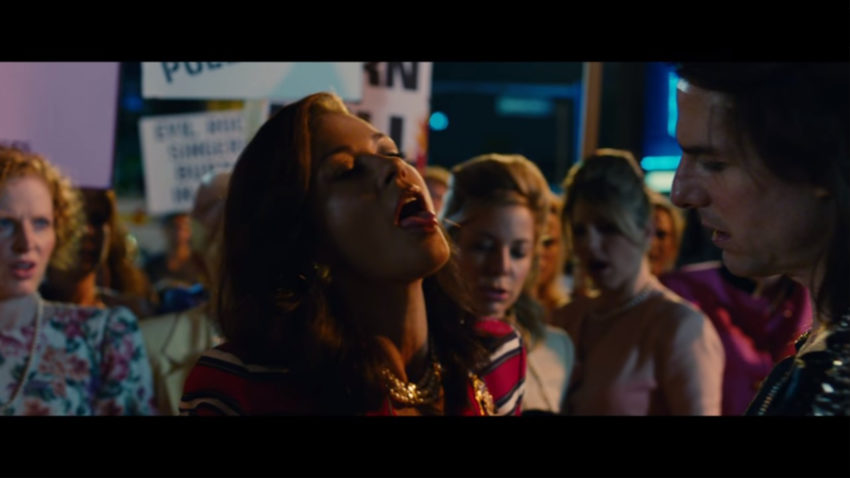
Near the end of the movie, Jaxx neutralizes the threat Patricia and her group of church ladies pose to the Bourbon by approaching her as she leads a protest outside of the club. He gropes her breasts, looks deep into her eyes, and addresses her by name. “Patty,” he says. “Your tits have held up well.” Cruise’s Jaxx only uses his unwanted powers of sexual persuasion for good, apparently. Patricia loses her cool, turns to putty in Jaxx’s hands, and her past with the rock star gets revealed to the public. In the final number of the film, Patricia’s decked out in leather and enjoying a rock concert. She can only enjoy rock music again once she’s been assured that her favorite rock god, Stacee Jaxx, still finds her sexually appealing.
The whole thing is so goofy that it’s impossible not to question the entire assumption that it’s normal to enjoy a rock star’s music because of your sexual attraction to him. This, combined with Stacee’s apparent psychological anguish at having to fulfill everyone’s sexual fantasies of him, reads as the film’s attempt to justify its strange investment in separating sex from the spirit of rock and roll. And, ten years later, it’s hard not to read it as Cruise’s justification for fully committing to a radically asexual kind of movie stardom from Rock of Ages on out.
Rock of Ages is, to this day, the last non-action film that Cruise has starred in. Most of his roles this century have been action flicks, but there’s been a purposeful escalation of the sexlessness since his divorce from Katie Holmes a decade ago. For good reason, since it nearly derailed his career, Cruise no longer wants us to think about his sex life at all. This pivot has worked. Cruise’s recent disinterest in being sexy/sexual/romantic on screen has gotten him praised as “the best place for women in action movies,” and, in light of Hollywood’s recently puritanical bent, his sexlessness doesn’t feel so out of place. In the wake of the massive success of Top Gun: Maverick, Cruise has been worshipfully lauded as The Last True Movie Star.****
In hindsight, it’s difficult not to see Stacee Jaxx as Cruise’s final, brilliantly contradictory word on the subject of anxieties over his own sex appeal. Jaxx is, on the one hand, ridiculous. The film gets laughs out of imagining a rock star who doesn’t seem to like sex. Of course all rock stars (and movie stars) like having sex. Only someone hilariously pathetic, someone like Stacee Jaxx, wouldn’t. But on the other hand, the film sympathizes with Jaxx’s burden. It’s also ridiculous, the film seems to say, to buy into the myth, to give rock stars (and movie stars) such sexual power. It’s ridiculous to be like Patricia, enjoying an entertainer’s work solely through the lens of their sex appeal.
By the end of the film, Jaxx is still making popular music, still a rock star performing to a huge arena crowd, and he’s happily partnered with Constance. (The only evidence provided that Stacee and Constance ever actually have sex is her visible pregnancy in the final scene.) He’s not groping anybody, getting groped, or thrusting his hips. He even has a shirt on. Sort of. It’s an open vest, but it’s more clothing than he’s worn on stage at any other point in the film. This fits with Rock of Ages’ most conservative assertions about sex, art, and fame. Of course famous men have and enjoy sex: procreative sex with blonde women who love them. But good art—good entertainment—should have nothing to do with that sex. Why should it? No sex, no drugs, just pure rock and roll.
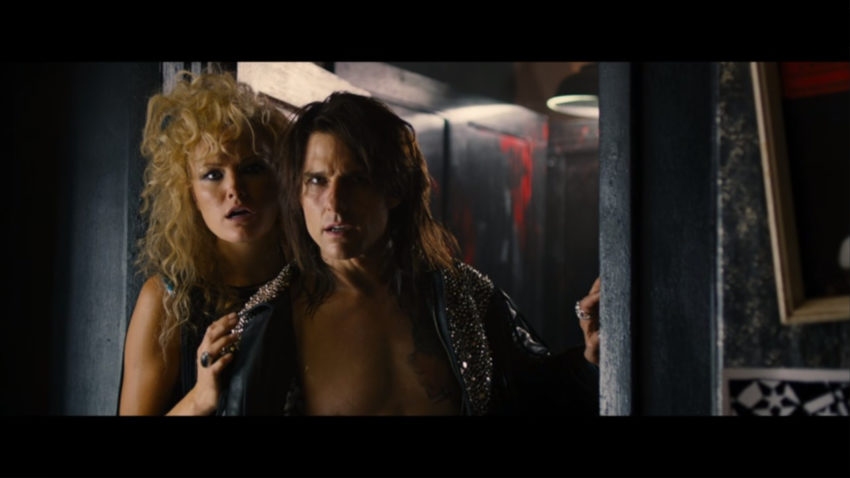
* The character of Stacee Jaxx was, reportedly, modeled at least in part on Axl Rose. In this introductory scene, Stacee’s green room is ostentatiously jungle-themed, which seems like a clear visual nod to the Guns N’ Roses’ hit “Welcome to the Jungle.”
** It’s also worth noting here that the film adaptation of Rock of Ages changes the story so that Stacee and Sherrie never have sex. In the stage version, the duet is between Stacee and Sherrie, and they unambiguously hook up. This leads Drew and Sherrie to break up. In the film version, the Rolling Stone reporter’s role is expanded to become Stacee’s love interest, and Drew only thinks Sherrie and Stacee have slept together based on a misunderstanding.
*** This would be much more in line with the Stacee Jaxx we get in the stage musical, who is a straightforward lech—a famous man who takes whatever he wants when it comes to sex. Not for nothing, by the end of the stage show, Jaxx has fled to Uruguay to evade charges of statutory rape.
**** As someone who became pop culturally aware in the aughts and learned who Tom Cruise was basically because of the Oprah couch thing (I was eleven when it happened), I never thought I’d live to see the day.
Dennis&Lonnie4Lyfe says:
This was an incredible analysis! I watched Rock of Ages with my friends this week, and was relentlessly mocked for being obsessed with this movie. You’ve hit the nail right on the head – while Sherrie and Drew’s storyline is mediocre at best, Jaxx is nothing short of dazzling.